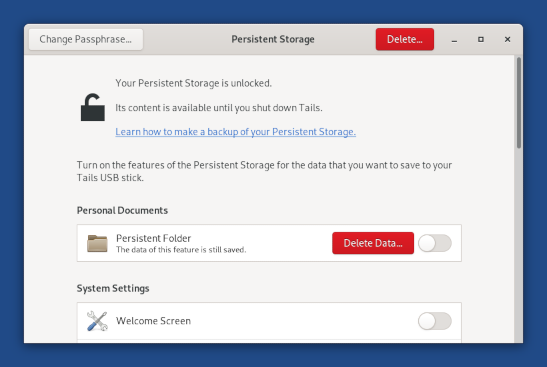Tails helps you to:
- Use the Internet anonymously and circumvent censorship
- All connections to the Internet are forced to go through the Tor network
- Leave no trace on the computer you are using unless you ask it explicitly
- Use state-of-the-art cryptographic tools to encrypt your files, emails and instant messaging
Tails is a live system that aims to preserve your privacy and anonymity. It helps you to use the Internet anonymously and circumvent censorship almost anywhere you go and on any computer but leaving no trace unless you ask it to explicitly.
It is a complete operating system designed to be used from a DVD, USB stick, or SD card independently of the computer's original operating system.
Tails comes with several built-in applications pre-configured with security in mind: web browser, instant messaging client, email client, office suite, image and sound editor, etc.
If you are interested in giving Tails a try on your current computer without running any risk, please check out our Guide: Running Linux From a USB Drive As a Virtual Machine or Bootable Disk.
What is Tails?
Tails is a portable Linux distribution based on Debian that combines the Tor network, the GNOME desktop and several other tools to offer a secure and anonymous computer experience.
How safe is Tails?
Tails is very safe as long as you do not run it on an infected machine. Tails is designed to run from a USB stick on any computer as a completely independent OS. However, if the host computer is infected with malware such as a keylogger your privacy would be at risk.
How does Tails ensure privacy?
Tails is set up out of the box to run from your computer's memory and never stores information locally unless you configure it to. This means that every time you shut down Tails, the memory is wiped clean, deleting all traces of your work and every new session starts as a blank slate.
Can I use Tails to circumvent censorship?
Yes, you can use Tails to circumvent internet censorship and browse the web anonymously. All the applications that come with Tails (email, browser, messaging client, office suite) use the Tor network to connect to the internet, so all your activity can be hidden.
Online anonymity and censorship circumvention with Tor
Tails relies on the Tor anonymity network to protect your privacy online:
- all software is configured to connect to the Internet through Tor
- if an application tries to connect to the Internet directly, the connection is automatically blocked for security.
Tor is free software and an open network that helps you defend against a form of network surveillance that threatens personal freedom and privacy, confidential business activities and relationships, and state security known as traffic analysis.
Tor protects you by bouncing your communications around a distributed network of relays run by volunteers all around the world: it prevents somebody watching your Internet connection from learning what sites you visit, and it prevents the sites you visit from learning your physical location.
Using Tor you can:
- be anonymous online by hiding your location
- connect to services that would be censored otherwise
- resist attacks that block the usage of Tor using circumvention tools such as bridges
What's New
New features
- Add curl, a command line tool to download over HTTPS, FTP, and other protocols. curl can be useful for online investigations as an alternative to wget.
- Everything you do with curl goes through the Tor network. If you want to use curl on a local network, use /usr/bin/curl instead.
Changes and updates
- Use LUKS2 by default for all new Persistent Storage and LUKS encrypted volumes. LUKS2 provide stronger cryptography by default.
- We will provide a migration plan from LUKS1 to LUKS2 for existing Persistent Storage in Tails 5.14 (early June).
- Update Tor Browser to 12.0.6.
Tails 5.12 changelog
New features
Data deletion when deactivating a feature of the Persistent Storage
- After you turn off a feature of the Persistent Storage, you can now click the Delete Data button to delete the data stored for this feature.

Passphrase suggestion when creating the Persistent Storage
When creating the Persistent Storage, a random and very secure passphrase is now displayed as a suggestion:
Changes and updates
- Update Tor Browser to 12.0.5.
- Update the Linux kernel to 6.1.20. This improves the support for newer hardware: graphics, Wi-Fi, and so on.
- Use a new icon for the backup utility for the Persistent Storage.
- This passphrase uses the diceware method to give very strong security guarantees while being possible to memorize.
- For example, a six-word passphrase like we suggest would take 3â¯505 years to crack at a trillion guesses a second.
Fixed problems
We fixed several reliability issues with the Persistent Storage:
- We improved the error message when a feature of the Persistent Storage fails to activate from the Welcome Screen to clarify which feature is affected.
- After starting Tails, the feature that failed to activate is marked as such in the Persistent Storage settings. You can try turning the feature off and on again or deleting its data to reset it entirely.
- We made the activation of the Persistent Storage more reliable in 2 error cases. (#19376 and #19331)
- We added a progress indicator while turning on a new feature to clarify that it can take some time. (#19291)
- We made sure that all data that is already available in Tails is really copied to the USB stick when turning on a feature. (#19368)


